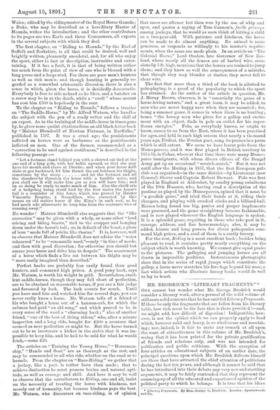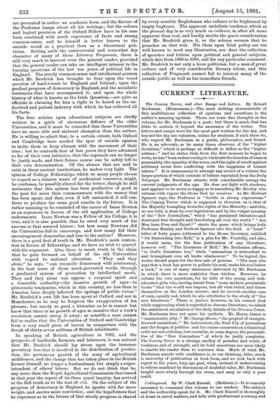MR. BRODRICK'S "LITERARY FRAGMENTS." * ONE cannot but wonder what
Mr. George Brodrick would consider a literary work, after a perusal of the solid volume of still more solid contents that he has entitled Literary Fragments. If these be only the fragments that are fallen from his literary table, how rich must be the fare that is there provided !—and, we might add, how difficult of digestion ! Indigestible, how- ever, is not the epithet which we can properly apply to food which, however solid and heavy, is so wholesome and nourish- ing; nor, indeed, is it fair to make any remark at all upon the want of attractiveness in this volume of Mr. Brodrick's, seeing that it has been printed for the private gratification of friends and relations only, and was not intended for publication and public criticism. With the exception of four articles on educational subjects of an earlier date, the principal questions upon which Mr. Brodrick delivers himself are those that have attracted the chief attention of politicians during the last ten years, and although it cannot be said that he has introduced into their debate any very new and startling arguments, it may be fairly contended that they represent the summing-up of all the educated and experienced opinion of the political party to which he belongs. It is true that his ideas
• Literary F1 aginents. By Ron. George C. Brodrick. London; Spottiswoode and Co.
are presented in rather an academic form, and the flavour of the Professor hangs about all his writings; but the culture and logical precision of the Oxford Fellow have in his case been combined with much experience of facts and strong common-sense, and he himself is better known to the outside world as a practical than as a theoretical poli- tician. Setting aside the controversial and somewhat dry character of many of these Literary Fragments, there is still very much to interest even the general reader, provided that the general reader can take an intelligent interest in the burning questions of the last ten years of political life in England. The sturdy common-sense and intellectual acumen which Mr. Brodrick has brought to bear upon the vexed question of land-tenure in England and Ireland ; upon the gradual progress of democracy in England, and the socialistic tendencies that have accompanied it ; and upon the whole history of what is known as the Irish Question,—are quite as efficient in claiming for him a right to be heard as the un- doubted and patient industry with which he has collected all his facts.
The four articles upon educational subjects are chiefly written in a spirit of strenuous defence of the older Universities, and it must be conceded that those Universities have no more able and stalwart champion than the author. He is willing to admit that, to a certain extent, both Oxford and Cambridge have needed the spur of outside opinion to incite them to keep abreast with the movement of their time ; but he contends that of late years they have advanced so far of their own initiative, that the reproach can no longer ba justly made, and their future course can be safely left to their own determination. Of the abuses that are said to exist in those ancient institutions, he makes very light. The system of College Fellowships, which so many people choose to regard as a ruinous waste of academical resources, might, he confesses, be possibly altered for the better, though he still maintains that this system has been productive of good in the past far more than commensurate with the money that has been spent, and that, even if left untouched, it will con- tinue to produce the same good results in the future. It is rather amusing to be reminded of the career of Isaac Newton as an argument in favour of the old application of College endowments. Isaac Newton was a Fellow of his College, it is true, and it is also possible that he owed very much of his success to that assured leisure ; but how many Newtons did the Universities fail to encourage, and how many did their encouragement demoralise and lose to the nation? However, there is a good deal of truth in Mr. Brodrick's main conten- tion in favour of fellowships, and we have no wish to quarrel with his argument. Also, there is much truth in the claim that he puts forward on behalf of the old Universities with regard to national education. "They and they alone," he says, "can reconcile democracy with aristocracy,
in the best sense of those much-perverted words, through a graduated system of promotion by intellectual merit.
They and they alone can oppose a corporal spirit and a venerable authority—the massive growth of ages—to plutocratic tendencies, which in this country, no less than in America, have deeply infected the springs of public virtue."
Mr. Brodrick's own life has been spent at Oxford, and not in Manchester, so he may be forgiven the exaggeration of his phrases ; but surely so good a historian as he is cannot but know that there is no growth of ages so massive that a week's revolution cannot sweep it away ; so sensible a man cannot fail to realise that the Universities of Oxford and Cambridge form a very small piece of leaven in comparison with the dough of thirty-seven millions of British inhabitants.
In speaking of British agriculture in 1882, and the prospects of landlords, farmers, and labourers, it was natural that Mr. Brodrick should lay stress upon the immense pecuniary loss that is involved in the distribution of produc- tion, the portentous growth of the army of agricultural middlemen, and the change that has taken place in the British farmer himself, no longer a husbandman, but simply a super- intendent of others' labour. But we do not think that he, any more than the Royal Agricultural Commission that issued in that year the report of its three years' inquiry, has arrived at the full truth as to the seat of evil. On the subject of the progress of democracy in England, he speaks with far more weight, and carries more conviction ; and the hopefulness that he expresses as to the future of that steady progress is shared at home in naval matters, and tells with professional accuracy and by every sensible Englishman who refuses to be frightened by empty bugbears. The apparent socialistic tendency, which at the present day is so very much en gvid.enee, is, after all, more apparent than real, and hardly merits the grave consideration that Mr. Brodrick gives it, or the solemn sermon that he preaches on that text. His ideas upon Irish policy are too well known to need any illustration, nor does the collection of speeches and letters upon political and general subjects, which date from 1868 to 1890, call for any particular comment.. Mr. Brodrick is not only a keen politician, but a man of great culture and of very considerable literary talent, and this collection of Fragments cannot fail to interest many of the outside public as well as his immediate friends.



































 Previous page
Previous page